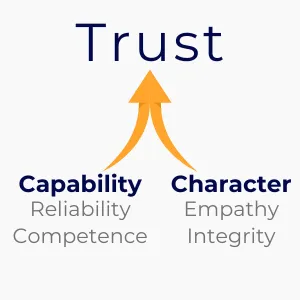
Traits of Trust
Do you talk about Trust as something to be built?
For most of my life I certainly did. I thought of it as something that I built, sometimes I used the language of "with" someone but in truth I mean TO SOMEONE. I was acting like becoming trusted was a decision I could make.
At best this is an illusion, but at worst it's the language of control.
Receiving trust isn't something the seeker can control, but control is subtly indicated with this "building trust" language. I can't decide to build trust with you. It must be given.
Trust isn't built, it's given and received.
Instead of building & control, we should think about Trust as something we give and receive from each other. The Trust Giver has the power to decide if, when & how much Trust will be extended.
I decide when to give you Trust.
You decide when to give me Trust.
I can only give you mine, and I can seek to receive yours.
Trust seeking behavior permeates relationships, professional & personal. Selling software, running for office or asking for a date are all tests of Trust. What I see though is that Trust seekers only leverage a narrow aspect of Trust dynamics; usually leaning on competence to do all the work.
Competence is necessary for Trust but often it overshadows equally important traits.

Remember Trust is an equation:
Trust = Capability x Character. Both sides of the Trust equation are necessary to form long lasting relationships.
When only competence is signaled it has to over deliver because it's working alone instead of with the rest of its team. It's kinda like playing a soccer match without the full squad taking the field.
Can you win the match? Maybe
But why overburden the other players?
The two dynamics we have talked about most are capability and character, but really each of those have important & distinct underlying traits
Capability is composed of competence and reliability.
Character is composed of empathy and integrity.
Competence gets more attention primarily because it is often the easiest to compose into a Trust Signal like university degrees performance dashboards whereas the character side of the equation is more difficult to signal. In my experience Trust bonds would be stronger if we gave empathy & integrity equal with the capability components.
You either have good character or not...right?
Well...kinda. Remember - establishing trust is often more about effectively signaling the traits you already have. How do you signal integrity? Can you just say:
🚩I'm an honest person🚩
If you're like me, that's an immediate red flag.
That sounds like....used car salesmen.
(BTW, I do know some very honest used car salesmen...).
To start thinking about how we signal integrity we must first broaden our definition of integrity past honesty. Honesty focuses on "telling the truth" or not lying. Integrity runs deeper.
Are actions aligned with words?
Is all the relevant information shared freely?
How believable is this delivery timeline?
How are commitments viewed?
Honesty is much closer to a binary issue, your either tell the truth or you don't. Integrity brings with it a more nuanced understanding, and a broader spectrum of signaling possibilities.
For a more detailed discussion on Signaling - check out my next blog.
